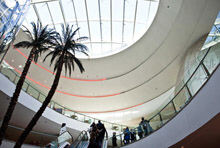
Typical street scene in Santa Ana, El Salvador. (Photo: iStock)
IMF Survey: Morocco Taps $6.2 Billion Precautionary Loan from IMF
August 3, 2012
- Morocco has solid economic fundamentals and a strong policy track record
- Liquidity line is insurance policy if international conditions worsen
- Reforms to improve social protection, boost job creation remain a priority
The Executive Board of the International Monetary Fund (IMF) has approved a $6.2 billion liquidity line for Morocco to help protect the country against swings in oil prices and potential fallout from the downturn in Europe.

A large mall in Casablanca: Morocco is implementing a series of political and economic reforms and made job creation a priority (photo: Jessica Chou/Sipa)
MIDDLE EAST
The 24-month loan is provided under the IMF’s new Precautionary and Liquidity Line (PLL). It will provide a useful insurance against external shocks in light of heightened uncertainty worldwide, and allow the authorities to continue with their home-grown reform agenda aimed at boosting inclusive economic growth.
The PLL was added to the IMF lending toolkit in 2011.
The IMF’s online news magazine, IMF Survey, spoke with Morocco mission chief Dominique Guillaume to discuss the reasons for the liquidity line and prospects for the country’s economy.
IMF Survey: Why does Morocco need a liquidity line from the IMF?
Guillaume: Morocco has solid economic fundamentals and a track record of implementing sound policies. But the world economy is in a particularly fragile situation right now, and uncertainties about the euro zone and oil price increases pose risks.
This liquidity line provides Morocco with a useful insurance policy for meeting immediate financing needs should these risks materialize. It aims to strengthen investors’ confidence and facilitate international market access by signaling that Morocco’s current policies are sound, and that the authorities have adequate resources to draw upon if needed. The PLL is precautionary, and Morocco has said that it does not intend to draw on it in the absence of exogenous shocks.
IMF Survey: What is a PLL and why is it right for Morocco?
Guillaume: This instrument is designed to flexibly meet the liquidity needs of member countries with sound economic fundamentals but with some remaining vulnerabilities.
Our financial assistance is designed to support the authorities’ economic policies by providing rapid access to resources—similar to an insurance policy—in the event of external shocks or a worsening international situation.
IMF Survey: What’s the outlook for Morocco? How do you see prospects for the country’s economy?
Guillaume: Overall real GDP growth is projected to slow from about 5 percent in 2011 to about 3 percent in 2012, largely as a result of lower agricultural growth following poor rainfall. However, despite sluggish growth in its advanced economy trading partners, Morocco’s nonagricultural GDP growth is projected to remain robust, reaching about 4.7 percent in 2012, as a result of strong domestic demand supported by an increase in government spending.
The current account deficit is expected to decline from 8 percent of GDP in 2011 to 7.4 percent in 2012, and to improve further over the medium term. Foreign exchange reserves should also stabilize in the second half of 2012 as a result of recent measures to tighten fiscal policy, a decline in international oil prices compared to early in the year, an increase in export volumes of phosphates and derivative products (Morocco’s main export), the production for exports of new industrial plants (Renault just started exporting from Morocco to Europe), and a seasonal pickup in tourism receipts.
IMF Survey: How has the Arab Spring affected Morocco?
Guillaume: Morocco has initiated a political reform process. A new constitution was adopted by referendum in July 2011, elections were held in November 2011, and the head of the Justice and Development Party, which received the highest number of votes during the elections, formed a new coalition government in January 2012. Local elections will follow the adoption of the planned new regionalization and budget organic laws.
The new constitution introduces broad-ranging political changes and reforms. These include a rebalancing of powers through greater oversight of parliament over the executive, greater responsibility of the government, and greater independence of the judiciary.
While these political reforms are important steps in addressing social demands, pressures persist for further reforms to address, among other issues, high youth unemployment, income inequalities, and governance.
IMF Survey: What are some steps the government is taking to address social demands?
Guillaume: The authorities have made job creation an important priority, with the aim of reducing unemployment from 8.9 percent in 2011 to 8 percent by 2016, and at increasing labor force participation rates, by strengthening ongoing active labor market programs and fostering employment outside the main cities in the context of reforms that pay more attention to underdeveloped areas.
In addition to maintaining a stable macroeconomic environment, the authorities have a reform agenda to increase potential economic growth over the medium term. These reforms should also help support continued strong export performance and foreign investment inflows, and therefore increase job opportunities.
Reforming the system of social protection for the most vulnerable segments of the population is another priority. To that end, costly universal subsidies could be better targeted to benefit those most in need. This will also allow spending on public investment to be preserved. To determine the best strategy for reforming the subsidy system, the authorities will consult broadly with civil society.


